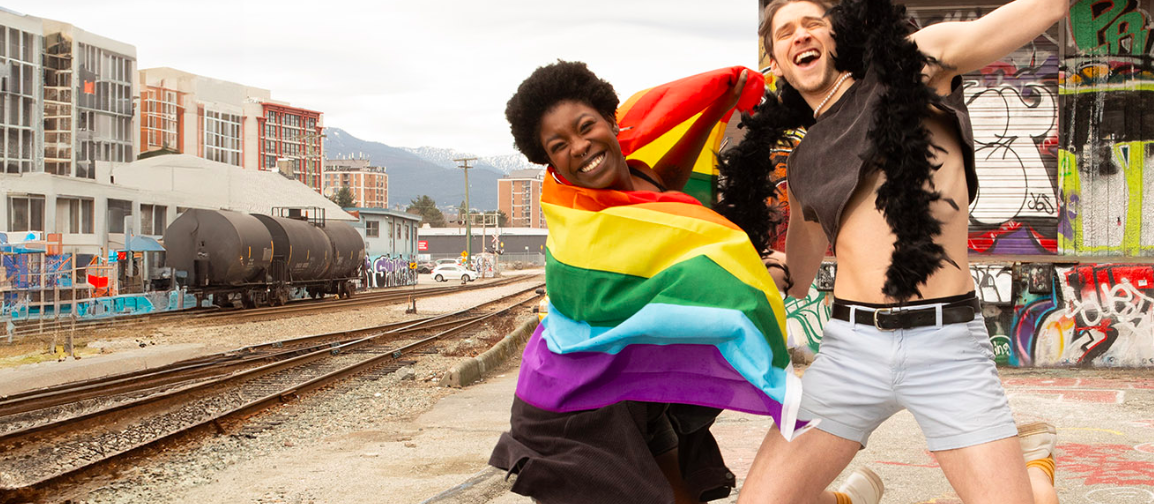Every Day She Rose confronts echoes of 2016 in Vancouver premiere at The Cultch
Codirectors Cameron Mackenzie and Diane Roberts unpack the story of two friends struggling with political differences after the Black Lives Matter protest at a Toronto Pride Parade
Ivy Charles and Jeffrey Follis, of Every Day She Rose. Photo by Tina Krueger Kulic
Every Day She Rose runs May 1 to 11 at the Vancity Culture Lab
IN EVERY DAY SHE ROSE, history doesn’t just repeat, but reverberates.
Set during a moment of cultural division in Canada, the play may resonate even more powerfully in 2025, as echoes of the past continue to shape the present political moment.
On May 1, Every Day She Rose will have its Vancouver premiere at the Vancity Culture Lab, presented by The Cultch and produced by Zee Zee Theatre. The story centres around two best friends as they confront the tensions between their racial and queer politics after witnessing the Black Lives Matter protest at the 2016 Toronto Pride Parade. Mark (a queer white man) and Cathy-Ann (a straight Black woman) must figure out how to resolve the cracks in their relationship, but in a metatheatrical twist, so must the playwrights behind them.
Chosen as part of The Cultch’s inaugural Warrior Festival as an “innovative, status-quo toppling” show, the story echoes themes that are deeply personal for codirectors Cameron Mackenzie and Diane Roberts.
“I had just landed back in Toronto after being in Vancouver when Black Lives Matter took over the parade,” says Roberts in a Zoom call alongside Mackenzie. “It really impacted me and I was able to distinguish our Black Lives Matter movement from the American Black Lives Matter movement based on some of the things they bring up in the play. When Cameron approached me in 2019 [about the play], I was really struck by revisiting that at that time.”
Roberts and Mackenzie each bring decades of distinct experience to the production. Roberts is a nationally and internationally recognized director, dramaturg, and cultural animator whose work champions African Indigenous storytelling traditions and community-driven theatre. Mackenzie, a Vancouver-based director, producer, and drag artist, originally hails from South Africa, and is the founder of Zee Zee Theatre. They began exploring a collaborative partnership against the backdrop of events like the murder of George Floyd and the 2016 Pulse nightclub shooting in Orlando, before COVID-19 ultimately put their plans on hold. Now in 2025, the theme of history repeating itself has only intensified.
“We are very aware of directing this play in 2025, which is a weird echo and mirror of 2016 when Trump was first in power,” says Roberts. “What does it feel like to think of ourselves in a reverse echo as we go back to 2016 and revisit some of these themes, but within the context of the now?”
Every Day She Rose was originally cowritten by playwrights Andrea Scott and Nick Green, after being inspired by the Black Lives Matter protest at Toronto Pride. Their partnership began through Nightwood Theatre’s Write from the Hip program, where they crafted the initial story about two roommates whose friendship is tested by intersecting tensions of race and queerness. Under the guidance of director Andrea Donaldson, the playwrights layered their own identities and experiences into the narrative, ultimately blurring the line between character and creator. As codirectors, Mackenzie and Roberts extend that layered approach, bringing their own lived experiences—and their dynamic as a queer white man and a Black woman—to the staging process.
“We started talking early on about the echoes that exist within the play,” says Mackenzie. “This play is demanding that you break out of this and hear other perspectives to broaden your own echo chamber. It became this thing that we fed all the other designs through to create that play box.”
Despite the story’s frank discussion of identity and allyship, Mackenzie and Roberts see Every Day She Rose as a story of hope, one that is still being written by Canadian audiences who are not unlike the characters on stage.
“I was interested in the politics and theory and arguments these characters make, and how the writers make this play,” says Mackenzie. “But it’s actually about the love between these two characters that they’re writing together. To have it at that depth where [Diane and I are] literally unpacking the same conversations, I think is really smart writing.”
Under The Cultch’s vision, the Warrior Festival holds joyful resistance and artistic bravery as central themes of its programming, and offers multiple engagements running across its three stages until May 11. For Roberts, the show offers the opportunity for Canadian audiences to model a different path forward.
“The title of the play, Every Day She Rose, is a line that comes near the end, when they’re trying to figure out where to go from here,” says Roberts. “As a Canadian audience, I hope that we keep that sense of self, this sense of ourselves as being part of a culture that not only tolerates differences, but seeks out that sense of difference and have these spaces where we can come together, celebrate together, and reason together.” ![]()
























